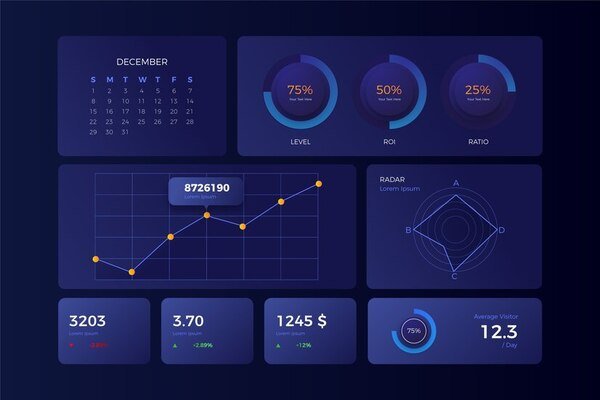Why Are Dashboards Critical For Digital Marketing Success?
In today’s business landscape, digital marketing relies heavily on data, and most businesses understand its importance. By analyzing the data they collect, companies can gain valuable insights into the effectiveness of their marketing strategies and better understand how their audience engages with their brand. However, the real challenge is ensuring this data is accessible and easy to interpret for everyone across the organization. Fortunately, with the advent of advanced dashboards, tracking and visualizing key metrics has become more straightforward than ever. Dashboards allow teams to quickly grasp performance indicators, making data-driven decisions more efficient and actionable in digital marketing efforts.

What exactly is a Marketing Dashboard?
A marketing dashboard is an essential tool for digital marketing, often developed with the help of specialized consulting services, to act as a centralized platform that gathers all your key performance indicators (KPIs) and critical metrics into one easy-to-read display. This data is pulled from a variety of internal and external sources, providing a comprehensive view of your marketing efforts. The best part is that this data is available in real-time, allowing you to monitor performance continuously and make timely adjustments. Unlike traditional analytics reports, which are typically delivered at the end of the month, dashboards offer up-to-the-minute insights, enabling quicker decision-making and more agile digital marketing strategies. With this level of immediacy, teams can respond faster to trends, optimize campaigns, and improve overall performance.

Strategies
There are numerous types of marketing dashboards available, each designed to focus on specific aspects of your digital marketing strategy. Email dashboards, website trackers, search analytics, and social media metrics can be integrated to provide valuable insights.
Some dashboards focus specifically on SEO related metrics, such as keyword rankings, backlinks, and organic traffic. Integrating these SEO focused dashboards with other digital marketing metrics ensures a holistic view of your strategy’s performance.

Advantages of Using a Marketing Dashboard
Tactic-specific dashboards can be valuable in tracking soft metrics like engagement, awareness, and interactions. However, for a comprehensive view of your digital marketing efforts, it’s essential to also incorporate hard metrics, such as the internal rate of return (IRR) and the net present value (NPV) of your campaigns. Additionally, key online marketing metrics—such as bounce rates, total visits, and click-through rates—should also be included. This is precisely why a full-featured marketing dashboard is indispensable. By integrating both soft and hard metrics, you gain a clearer picture of how your digital marketing strategies are contributing to the bottom line. Below are just a few reasons why incorporating a marketing dashboard can be a game-changer for your business:
Tailor your dashboard to suit your requirements
Instead of being limited by tactic-specific dashboards, a marketing dashboard gives you the flexibility to customize which metrics are displayed. This allows you to pull the most important data from your social media, email, and search efforts and visually represent them on a single, easy-to-read display. By consolidating all relevant metrics into one dashboard, you can quickly assess the performance of your various channels and make data-driven decisions without having to switch between multiple tools. This level of customization ensures that you’re focused on the key metrics that matter most to your business goals.
Monitor the effectiveness of your marketing activities
A properly optimized marketing dashboard makes it easy to track the performance of your marketing efforts in real-time, from social media engagement to lead generation on your website. With the ability to monitor key performance indicators (KPIs) and metrics, you can quickly identify how individual tactics are performing and adjust accordingly. A well-designed dashboard gives an overview of strategy performance, helping you assess the effectiveness of your efforts.
Ensure your team stays aligned and coordinated
A key challenge in business is aligning all employees with the company’s goals and strategies.A marketing dashboard lets all teams, from marketing to sales, see what’s working and what isn’t. This transparency fosters better communication across departments, ensuring that everyone is on the same page. With real-time insights, teams can collaborate more effectively, making timely adjustments to marketing and sales strategies to improve overall performance. This streamlined communication not only enhances teamwork but also ensures that the business can quickly adapt to changing market conditions.
Facilitate better-informed decision-making
Being able to monitor your marketing campaign’s performance in real-time provides the flexibility to adjust strategies and tactics as needed. In the past, traditional reporting only told you how you performed after the fact. With the use of marketing dashboards, you can make more informed decisions on a daily basis, allowing you to optimize your efforts continuously. This real-time data enables quicker adjustments, which can help reduce the cost of your marketing activities and increase their impact on your revenue cycle.
A marketing dashboard is more than a real-time report; it’s a powerful decision-making tool.
Conclusion
Dashboards are essential tools for businesses to maximize their data in today’s fast-paced digital marketing environment. Dashboards centralize KPIs and metrics in a real-time, customizable platform, improving decision-making, communication, and campaign optimization.
FAQs:
Which businesses benefit most from marketing dashboards?
Marketing dashboards are useful for businesses of all sizes. Especially in industries like e-commerce, healthcare, and tech, where real-time insights drive performance.
How do you integrate multiple data sources into a dashboard?
Dashboards pull data from various tools via APIs or third-party connectors. Thus allowing seamless integration of analytics, social media, and email marketing data.
How secure is my data in a marketing dashboard?
Dashboards use encryption, access controls, and other security measures to ensure data protection and prevent unauthorized access.
Can dashboards be customized for different teams?
Yes, dashboards can be tailored by role. This allows the teams like sales or social media to view metrics relevant to their specific needs.
How do dashboards help measure ROI?
Dashboards track KPIs like conversion rates and customer acquisition costs, providing insights into campaign ROI and guiding budget decisions.
